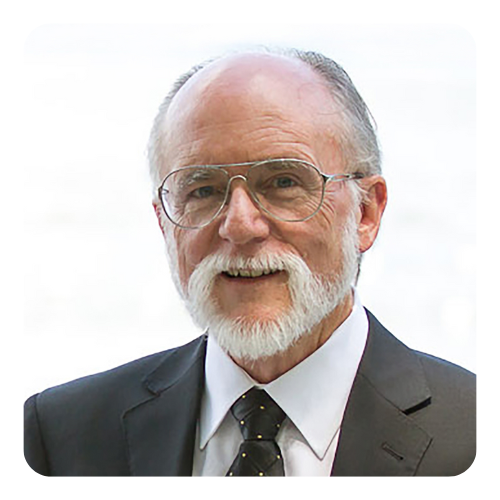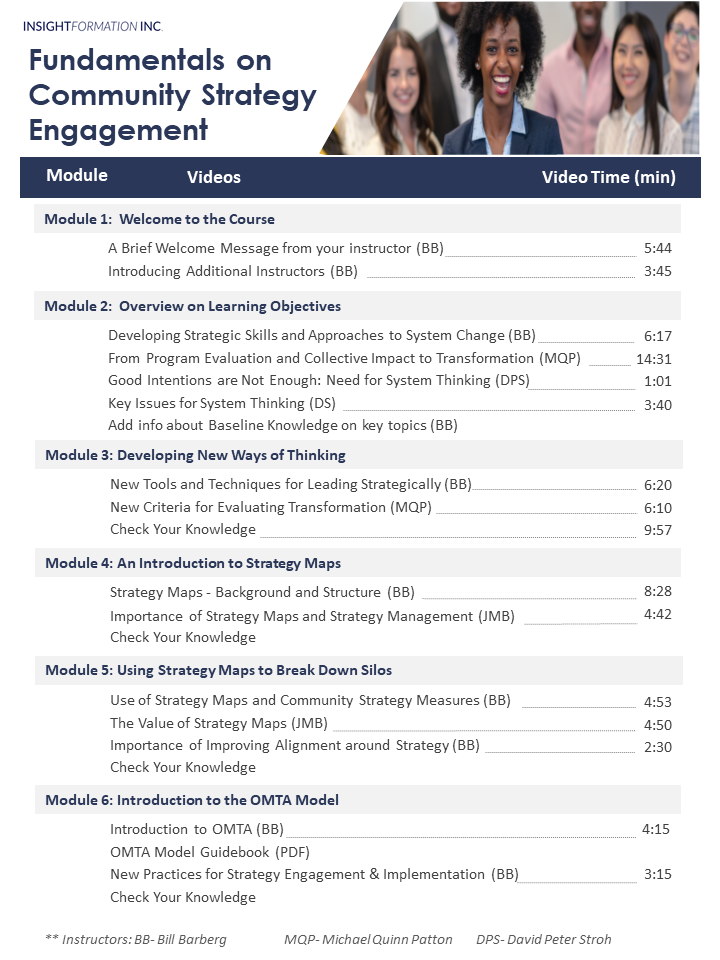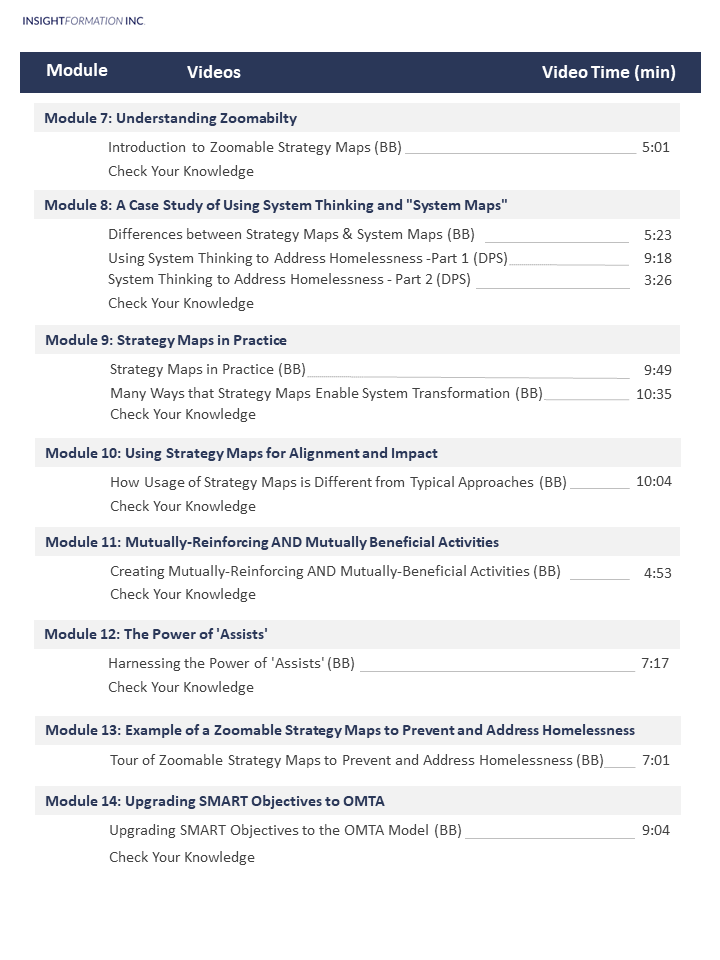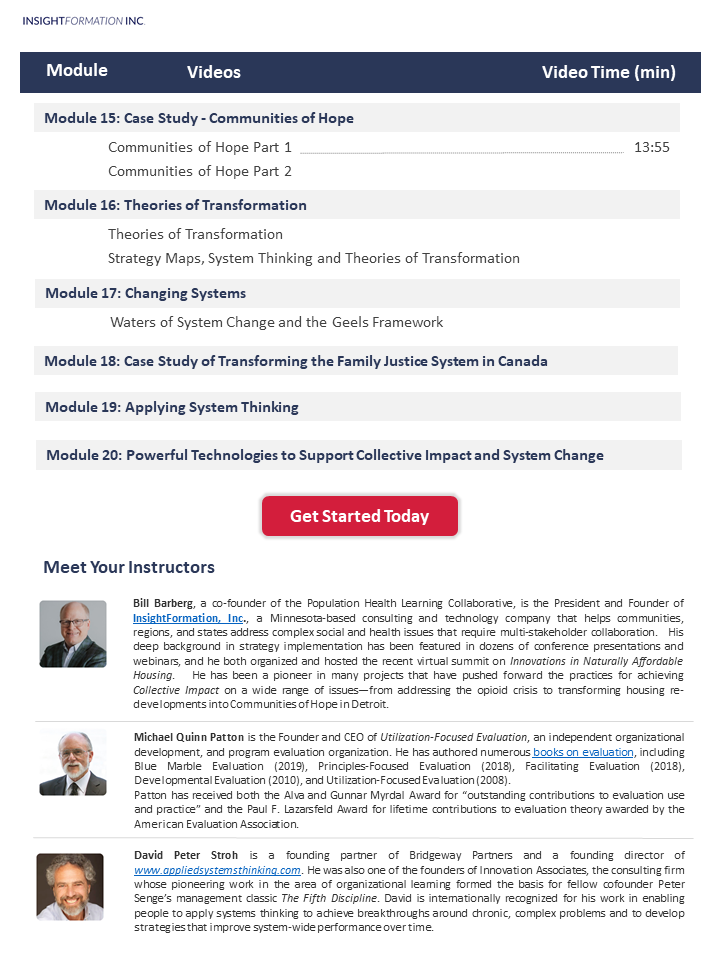Fundamentals of Community Strategy Engagement Course
Learn from top experts in system thinking, strategy design and implementation, Collective Impact, evaluation and system change.
This 7-hour self-paced course introduces and explains key concepts, tools, and techniques for developing, implementing, and evaluating multi-stakeholder strategies to address complex social challenges and system change. It is ideal for leaders or participants in coalitions working to accomplish collective impact or social transformation. This overview course includes 18 modules that have videos ranging from 3 to 7 minutes each, followed by questions to reinforce and confirm learning.
The instructors for this course include influential thought leaders, Michael Quinn Patton, Bill Barberg, John M. Bryson, David Stroh, and Barbara Crosby.
Participants are introduced to strategy maps, a highly effective tool for creating and implementing strategies—especially for a process where strategies are co-created by members of a coalition over time. The course provides a solid introduction to the OMTA structure for strategies (Objectives, Measures, Targets, and Actions). The course explains how this structure helps to build consensus, tame complexity, improve teamwork, and create streamlined monitoring of actions by different team members.
The course includes specific examples of how to use strategy maps, and it shows how developing a strategy using a strategy map reinforces system thinking, collaborative problem solving, and improved use of existing resources. It also provides guidance for developing measures, targets, and action plans.
People taking this course will learn the importance and practices of system thinking. They will learn how to develop sustainable strategies that align and engage community partners in on-going implementation of plans that accomplish more than the organizations could accomplish if working independently.
Topics used as examples in the course include increasing healthy eating, minimizing homelessness, transforming the family justice system, transforming child welfare, building community wellbeing in affordable apartment complexes, chronic disease prevention, and preventing and addressing Adverse Childhood Experiences (ACEs).
The training features topics found in the peer-reviewed article written by Bill Barberg, John Bryson, Barbara C. Crosby, and Michael Quinn Patton, for the Journal of Change Management, “Leading Social Transformations: Creating Public Value and Advancing the Common Good”.
To allow time for viewing all the material, taking notes and participating in the discussion boards available throughout the course, consider scheduling five 1-hour appointments with yourself over a two-week period.
Target Audience:
This overview course is designed for the following individuals:
People involved with leading or supporting coalitions addressing health issues or social determinants of health;
People in leadership roles of organizations actively involved in developing and managing the implementation of a collaborative strategy, such as hospitals, United Ways, or community-based organizations;
People working to change systems such as foster care, family justice, or early childhood development;
Public health professionals or students;
Population health leaders and staff in healthcare providers seeking to better collaborate with community organizations to improve prevention, reduce readmissions, and improve outcomes;
Consultants or those providing technical assistance for collective impact or community strategies;
Government or philanthropic organizations funding efforts to enhance community health, improve social determinants of health, or address the housing crisis.
Meet Your Instructors
Bill Barberg, a co-founder of the Population Health Learning Collaborative, is the President and Founder of InsightFormation, Inc., a Minnesota-based consulting and technology company that helps communities, regions, and states address complex social and health issues that require multi-stakeholder collaboration. His deep background in strategy implementation has been featured in dozens of conference presentations and webinars, and he both organized and hosted the recent virtual summit on Innovations in Naturally Affordable Housing. He has been a pioneer in many projects that have pushed forward the practices for achieving Collective Impact on a wide range of issues—from addressing the opioid crisis to transforming housing re-developments into Communities of Hope in Detroit.
Bill was selected to write the chapter on “Implementing Population Health Strategies” for the book, “Solving Population Health Problems through Collaboration” (Routledge, 2017). His recommendations for using strategy maps is featured as a core recommendation in the new report by the National Academy of Public Administration. Bill recently co-authored a paper for the Journal of Change Management on “Leading Social Transformations to Create Public Value and Advance the Common Good”.
Learn more about Bill Barberg in this 6-minute video.
Michael Quinn Patton is the Founder and CEO of Utilization-Focused Evaluation, an independent organizational development, and program evaluation organization.
He has authored numerous books on evaluation, including Blue Marble Evaluation (2019), Principles-Focused Evaluation (2018), Facilitating Evaluation (2018), Developmental Evaluation (2010), and Utilization-Focused Evaluation (2008).
Patton has received both the Alva and Gunnar Myrdal Award for “outstanding contributions to evaluation use and practice” and the Paul F. Lazarsfeld Award for lifetime contributions to evaluation theory awarded by the American Evaluation Association.
David Peter Stroh is a founding partner of Bridgeway Partners and a founding director of www.appliedsystemsthinking.com. He was also one of the founders of Innovation Associates, the consulting firm whose pioneering work in the area of organizational learning formed the basis for fellow cofounder Peter Senge’s management classic The Fifth Discipline. David is internationally recognized for his work in enabling people to apply systems thinking to achieve breakthroughs around chronic, complex problems and to develop strategies that improve system-wide performance over time.
Course Outline
>> Download the Course Outline HERE.
What Participants Are Saying…
<< Return to E-Learning Programs







